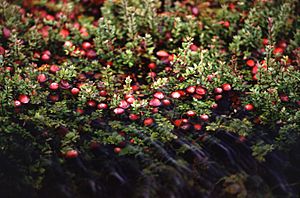Large cranberry
Quick facts for kids Large cranberry |
|
|---|---|
 |
|
| Scientific classification | |
| Kingdom: | |
| (unranked): | |
| (unranked): | |
| (unranked): | |
| Order: | |
| Family: | |
| Genus: | |
| Subgenus: | |
| Species: |
V. macrocarpon
|
| Binomial name | |
| Vaccinium macrocarpon Aiton 1789
|
|
| Synonyms | |
|
Synonymy
Vaccinium oxycoccos var. oblongifolium Michx.
Schollera macrocarpos (Aiton) Britton Oxycoca macrocarpa (Aiton) Raf. Oxycoccus macrocarpos (Aiton) Pers. Oxycoccus macrocarpus (Aiton) Pers. Oxycoccus palustris var. macrocarpos (Aiton) Pers. Schollera macrocarpa (Aiton) Steud. Vaccinium propinquum Salisb. |
|
The large cranberry (also known as American cranberry or bearberry) is a type of cranberry plant. Its scientific name is Vaccinium macrocarpon. This plant is native to North America. It belongs to the same plant family as blueberries.
What Cranberries Look Like
Cranberry plants are small shrubs that live for many years. They often trail along the ground. Then, their stems curve upwards.
These plants produce pretty white or pink flowers. After the flowers, small, round red or pink berries grow. These berries taste quite sour. They are usually about 9 to 14 millimeters (about 0.35 to 0.55 inches) wide.
Where Cranberries Grow
Cranberries are originally from central and eastern Canada. You can find them from Ontario all the way to Newfoundland. They also grow in the northeastern and north-central United States. This includes areas like the Great Lakes Region and the Appalachian Mountains. They grow as far south as North Carolina and Tennessee.
Cranberries have also started to grow in other parts of the world. They are now found in some areas of Europe. You can also find them in western Canada, like British Columbia, and on the West Coast of the United States.
How People Use Cranberries
Cranberries are a very important cash crop. This means they are grown and sold for money. People grow them for their tasty berries.
Many cranberries are grown in special artificial ponds called cranberry bogs. These bogs are flooded with water to help harvest the berries.
The most common way people use cranberries is to make sauce. This sauce is often served with roast turkey, especially during holidays. Cranberry juice is also very popular.
Some studies suggest that cranberries or their juice might help with certain urinary tract infections. However, this is not fully proven yet. It's important to remember that cranberries are not a substitute for medicine if you are sick. Always talk to a doctor if you have a health problem.
See also
 In Spanish: Cranberry para niños
In Spanish: Cranberry para niños

